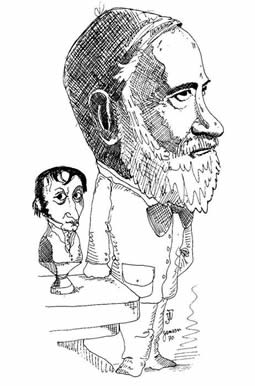
"Molecular Weight"
November 11, 2005
Stanislao Cannizzaro (1826-1910) Professor at Alessandria (1851-1854), Genoa (1855-1859), Palermo (1860-1869) and Rome (1870-1910), Cannizzaro is best known for his discovery of the Cannizzaro reaction in organic chemistry for the conversion of aromatic aldehydes into the corresponding acids and alcohols, and his successful resolution of the atomic weight problem. Though Dalton had introduced the idea of extracting atomic weights from combining weights in 1803, he was unable to do this in a completely unambiguous fashion and, as a result, 50 years of chaos followed during which chemists used a variety of competing atomic and equivalent weight values. In 1858 Cannizzaro published a small pamphlet in which he reasserted Avogadro's earlier hypothesis (1811) that gas densities at equal pressures were directly proportional to molecular weights. Whereas Avogadro had attempted to extract atomic weights from the resulting molecular weights by using the stoichiometries of gas reactions - a procedure that could be applied only to a few elements - Cannizzaro showed how this same information could be extracted by using the gravimetric composition of an element's volatile compounds - a procedure that was virtually universal. With Cannizzaro's advance, chemists finally acquired a standard set of atomic weights and were able to determine unambiguous and universally accepted compositional formulas for their compounds.
Courtesy of Professor William Jensen, Oesper Chair of the History of Chemistry and Chemical Education, University of Cincinnati
> Past Notable Chemists